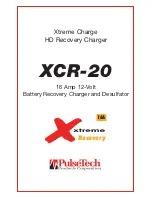
5
co70006
the negative (-) terminal of the accumulator.
ź
The charger will start charging automatically and the
charging voltage and accumulator charge status will
appear on the screen.
ź
After charging the accumulator, the charger
automatically switches to the charged mode in which
the microprocessor delivers targeted charging without
overcharging or damaging the battery.
ź
Always disconnect the charger from the 230V mains
and after then from the accumulator after charging.
ź
If you have opened the battery cell closures, you must
close them again.
RECONDITION
– systematic pulse strikes to
restore the battery to good condition
ź
Be careful not to use this mode for AGM batteries.
ź
Insert the positive clamp of the charger (red) to the
positive (+) terminal of the accumulator.
ź
Connect the negative clamp of the charger (black) to
the negative (-) terminal of the accumulator.
ź
The charger will start charging automatically and the
charging voltage and accumulator charge status will
appear on the screen.
ź
After charging the accumulator, the charger
automatically switches to the charged mode in which
the microprocessor delivers targeted charging without
overcharging or damaging the battery.
ź
Always disconnect the charger from the 230V mains
and after then from the accumulator after charging.
ź
If you have opened the battery cell closures, you must
close them again.
SUPPLY
– power supply of the vehicle with
battery removed to keep on-board systems
running
ź
Switch the charger to SUPPLY mode
ź
The charger will begin to provide a constant voltage
and current of 10 A.
ź
Connect the charger to the car - the red clamp to the
positive (+) cable to the accumulator, the black to the
negative (-).
ź
Disconnect the battery from the car and remove it.
ź
Now, on-board vehicle systems are powered directly
from the charger, and there is no risk of loss of setup in
the car when the battery is removed.
ź
Be careful - never start the car in this mode.
BATTERY TEST
mode
ź
For testing, only battery current is used, do not connect
the charger to the 230V mains during the test
ź
Connect the charger to the car - the red clamp to the
positive (+) cable to the accumulator, the black to the
negative (-).
ź
The current battery voltage and the status symbol are
displayed on the screen.
ź
To test the correct function of the alternator, connect
the charger to the battery in the car, start the engine
and rev up to 2,000 rpm.
ź
The current battery voltage and the status symbol are
displayed on the screen.
Displayed symbols:
The battery is charged.
The battery is only partially charged.
The battery is very low charged.
The alternator works properly.
The alternator overcharges or does not charge
the battery properly.
Poor polarity or short circuit indicator light –
disconnect the charger from the socket and
connect the battery correctly.
The charger is overheated – disconnect the
charger, wait for 30 minutes, then try again.
Low temperature compensation – if the outdoor
temperature is less than 0°C, the charger
automatically switches to winter charging mode.
Warning:
Heavily discharged and damaged car batteries can not be
charged by using this charger. If the 12V car battery
voltage drops below 8V, the microprocessor in the charger
will mark the battery as damaged and will not charge it!
If the 12V car battery voltage drops below an acceptable
level, the charger can evaluate this car battery as 6V and
will not charge it properly!
The manufacturer does not take responsibility for
accidents or damages resulting from non-compliance with
this manual.
Changes in text, design, and technical specifications
could be changed without previous warning and we
reserve the right to change them.
Disposal and recycling
Do not dispose power tools and devices into the
household waste!
According to European Directive 2012/19 / EC
on Waste Electrical and Electronic Equipment
(WEEE) and in the enforcement of national law,
used power tools must be collected separately
and shipped to an appropriate recycling plant.






































